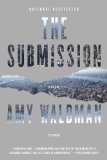Summary | Excerpt | Reading Guide | Reviews | Beyond the Book | Readalikes | Genres & Themes | Author Bio

A Novel
by Amy Waldman
On the veranda Maria was eyeing her quizzically. Claire met her stare and took a drag so dizzying she had to grip the railing for support. She felt only a little guilty. Everything she said had been true except her certainty that the hand reaching up was Cal's.
Maria switched first. "The Garden," she said bravely. Claire started to mouth "Thank you," then thought better of it. The critic came next. "The Garden." This gave slightly less pleasure: Claire, studying his bassethound face and poodle hair, had the disappointed sense that he had changed his vote because he was tired. Still, the Garden had eight votes now, which meant victory was in sight. But instead of celebrating, Claire began to sink inside. Tomorrow, absent the memorial competition, her life would lose its last bit of temporary form. She had no need of income, given her inheritance from Cal, and no commanding new cause. Her future was gilded blankness.
Aftermath had filled the two years since Cal's death, the surge of grief yielding to the slow leak of mourning, the tedium of recovery, bathetic new routines that felt old from the get-go. Forms and more forms. Bulletins from the medical examiner: another fragment of her husband had been found. The cancellation of credit cards, driver's license, club memberships, magazine subscriptions, contracts to buy works of art; the selling of cars and a sailboat; the scrubbing of his name from trusts and bank accounts and the boards of companies and nonprofits - all of it done with a ruthless efficiency that implicated her in his effacement. Offering her children memories of their father, only to load the past with so much value it strained beneath the weight.
But aftermath had to end. She sensed herself concluding a passage that had begun fourteen years ago, when a blue-eyed man notable less for good looks than for sheer vitality and humor and confidence had stopped her as she came off the tennis court he was taking over and said, "I'm going to marry you."
The comment, she would come to learn, was typical of Calder Burwell, a man with a temperament so sunny that Claire nicknamed him California, even though it was she, having grown up there, who knew the state's true fickle weather: the frost and drought that had kept her grandfather, a citrus farmer, perched near ruin for years before her father plunged straight into it. Of all her anguished, unanswerable wonderings about Cal's death - where, how, how much pain - the worst, somehow, was the fear that his last moments had buckled his abiding optimism. She wanted him to have died believing that he would live. The Garden was an allegory. Like Cal, it insisted that change was not just possible, but certain.
"It's eleven o'clock," Paul said. "I think someone may need to reconsider his or her vote. How can we ask this country to come together in healing if this jury can't?"
Guilty looks. A long silence. And finally, from the historian, an almost speculative "Well..." All bleary eyes turned to him, but he said nothing more, as if he had realized he held the fate of a six-acre chunk of Manhattan in his hands.
"Ian?" Paul prodded.
Even if inebriated, Ian wasn't going without a lecture. He noted the beginnings of public gardens in suburban cemeteries in eighteenthcentury Europe, segued into the garden-based reforms of Daniel Schreber in Germany ("We're interested in his social reforms, not the 'reforms' he carried out on his poor sons"), jumped to the horror conveyed by Lutyens's Memorial to the Missing of the Somme at Thiepval, in which seventy-three thousand names - "Seventy-three thousand!" Ian exclaimed - were inscribed on its interior walls, pondered the difference between "national memory" and "veteran's memory" at Verdun, and concluded, some fifteen minutes later, with: "And so, the Garden."
Paul, then, would be the tenth and final vote, and this didn't displease him. He had insisted, for himself, on not just public neutrality but internal neutrality as well, so that no design had been allowed to catch his fancy. But over the course of the evening he had begun rooting for the Garden. "Stumble on joy" - the phrase had knocked something loose in him. Joy: What did it feel like? Trying to remember, he was overcome by longing. He knew satisfaction, the exhilaration of success, contentment, and happiness to the extent he could identify it. But joy? He must have felt it when his sons were born - that kind of event would surely occasion it - but he couldn't remember. Joy: it was like a handle with no cupboard, a secret he didn't know. He wondered if Claire did.
Excerpted from The Submission by Amy Waldman. Copyright © 2011 by Amy Waldman. Excerpted by permission of Farrar, Straus & Giroux. All rights reserved. No part of this excerpt may be reproduced or reprinted without permission in writing from the publisher.
Your guide toexceptional books
BookBrowse seeks out and recommends the best in contemporary fiction and nonfiction—books that not only engage and entertain but also deepen our understanding of ourselves and the world around us.